Relationships Between Projects, Programs and Portfolio Management
VerifiedAdded on 2022/10/01
|8
|2626
|414
Report
AI Summary
This report comprises four reflections on key articles related to project portfolio management (PPM). The first reflection discusses the role of project portfolio managers, highlighting their importance in improving management effectiveness and company success, while also acknowledging the potential challenges to organizational authority. The second reflection focuses on measuring program success, exploring the dimensions and models involved, and the benefits of implementing a program success system. The third reflection examines an integrated PPM process, emphasizing the benefits of implementing PPM systems and its impact on productivity and success. The final reflection addresses the role of PPM in fostering both deliberate and emergent strategy, highlighting the strategic advantages and best practices for strengthening the model. These reflections provide a comprehensive overview of the key concepts, benefits, and challenges associated with PPM and program success, offering valuable insights for project management professionals.
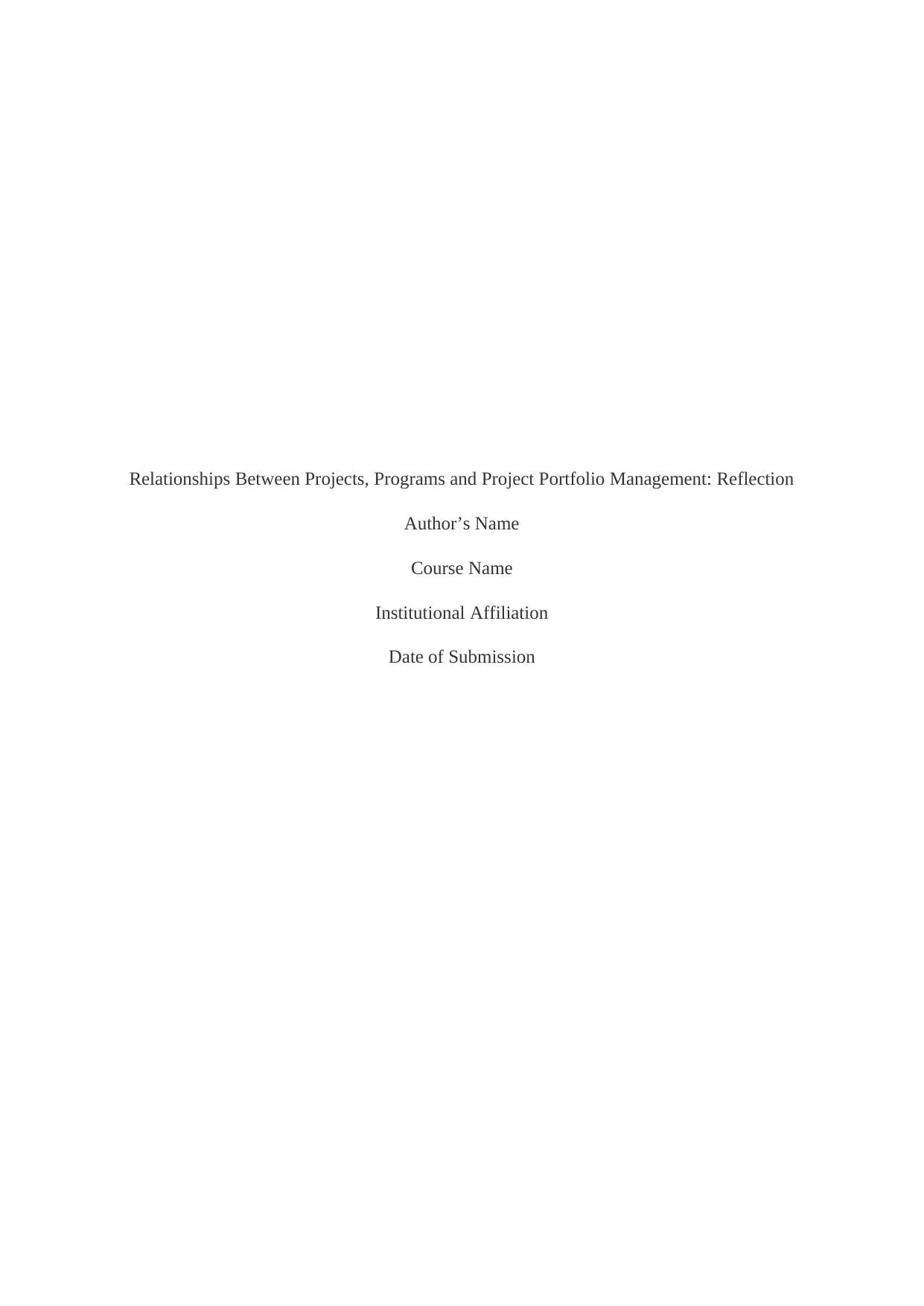
Relationships Between Projects, Programs and Project Portfolio Management: Reflection
Author’s Name
Course Name
Institutional Affiliation
Date of Submission
Author’s Name
Course Name
Institutional Affiliation
Date of Submission
Paraphrase This Document
Need a fresh take? Get an instant paraphrase of this document with our AI Paraphraser
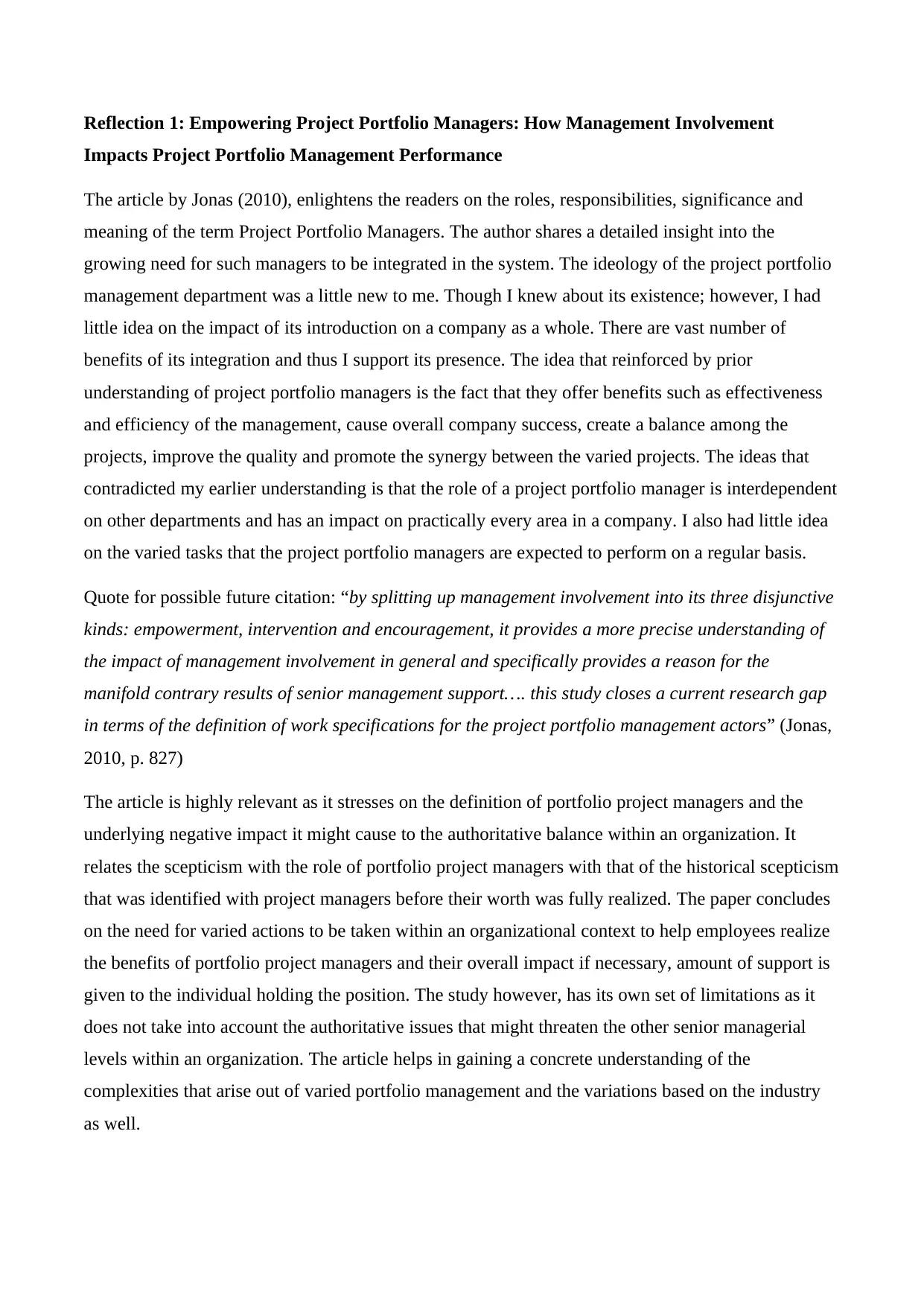
Reflection 1: Empowering Project Portfolio Managers: How Management Involvement
Impacts Project Portfolio Management Performance
The article by Jonas (2010), enlightens the readers on the roles, responsibilities, significance and
meaning of the term Project Portfolio Managers. The author shares a detailed insight into the
growing need for such managers to be integrated in the system. The ideology of the project portfolio
management department was a little new to me. Though I knew about its existence; however, I had
little idea on the impact of its introduction on a company as a whole. There are vast number of
benefits of its integration and thus I support its presence. The idea that reinforced by prior
understanding of project portfolio managers is the fact that they offer benefits such as effectiveness
and efficiency of the management, cause overall company success, create a balance among the
projects, improve the quality and promote the synergy between the varied projects. The ideas that
contradicted my earlier understanding is that the role of a project portfolio manager is interdependent
on other departments and has an impact on practically every area in a company. I also had little idea
on the varied tasks that the project portfolio managers are expected to perform on a regular basis.
Quote for possible future citation: “by splitting up management involvement into its three disjunctive
kinds: empowerment, intervention and encouragement, it provides a more precise understanding of
the impact of management involvement in general and specifically provides a reason for the
manifold contrary results of senior management support…. this study closes a current research gap
in terms of the definition of work specifications for the project portfolio management actors” (Jonas,
2010, p. 827)
The article is highly relevant as it stresses on the definition of portfolio project managers and the
underlying negative impact it might cause to the authoritative balance within an organization. It
relates the scepticism with the role of portfolio project managers with that of the historical scepticism
that was identified with project managers before their worth was fully realized. The paper concludes
on the need for varied actions to be taken within an organizational context to help employees realize
the benefits of portfolio project managers and their overall impact if necessary, amount of support is
given to the individual holding the position. The study however, has its own set of limitations as it
does not take into account the authoritative issues that might threaten the other senior managerial
levels within an organization. The article helps in gaining a concrete understanding of the
complexities that arise out of varied portfolio management and the variations based on the industry
as well.
Impacts Project Portfolio Management Performance
The article by Jonas (2010), enlightens the readers on the roles, responsibilities, significance and
meaning of the term Project Portfolio Managers. The author shares a detailed insight into the
growing need for such managers to be integrated in the system. The ideology of the project portfolio
management department was a little new to me. Though I knew about its existence; however, I had
little idea on the impact of its introduction on a company as a whole. There are vast number of
benefits of its integration and thus I support its presence. The idea that reinforced by prior
understanding of project portfolio managers is the fact that they offer benefits such as effectiveness
and efficiency of the management, cause overall company success, create a balance among the
projects, improve the quality and promote the synergy between the varied projects. The ideas that
contradicted my earlier understanding is that the role of a project portfolio manager is interdependent
on other departments and has an impact on practically every area in a company. I also had little idea
on the varied tasks that the project portfolio managers are expected to perform on a regular basis.
Quote for possible future citation: “by splitting up management involvement into its three disjunctive
kinds: empowerment, intervention and encouragement, it provides a more precise understanding of
the impact of management involvement in general and specifically provides a reason for the
manifold contrary results of senior management support…. this study closes a current research gap
in terms of the definition of work specifications for the project portfolio management actors” (Jonas,
2010, p. 827)
The article is highly relevant as it stresses on the definition of portfolio project managers and the
underlying negative impact it might cause to the authoritative balance within an organization. It
relates the scepticism with the role of portfolio project managers with that of the historical scepticism
that was identified with project managers before their worth was fully realized. The paper concludes
on the need for varied actions to be taken within an organizational context to help employees realize
the benefits of portfolio project managers and their overall impact if necessary, amount of support is
given to the individual holding the position. The study however, has its own set of limitations as it
does not take into account the authoritative issues that might threaten the other senior managerial
levels within an organization. The article helps in gaining a concrete understanding of the
complexities that arise out of varied portfolio management and the variations based on the industry
as well.
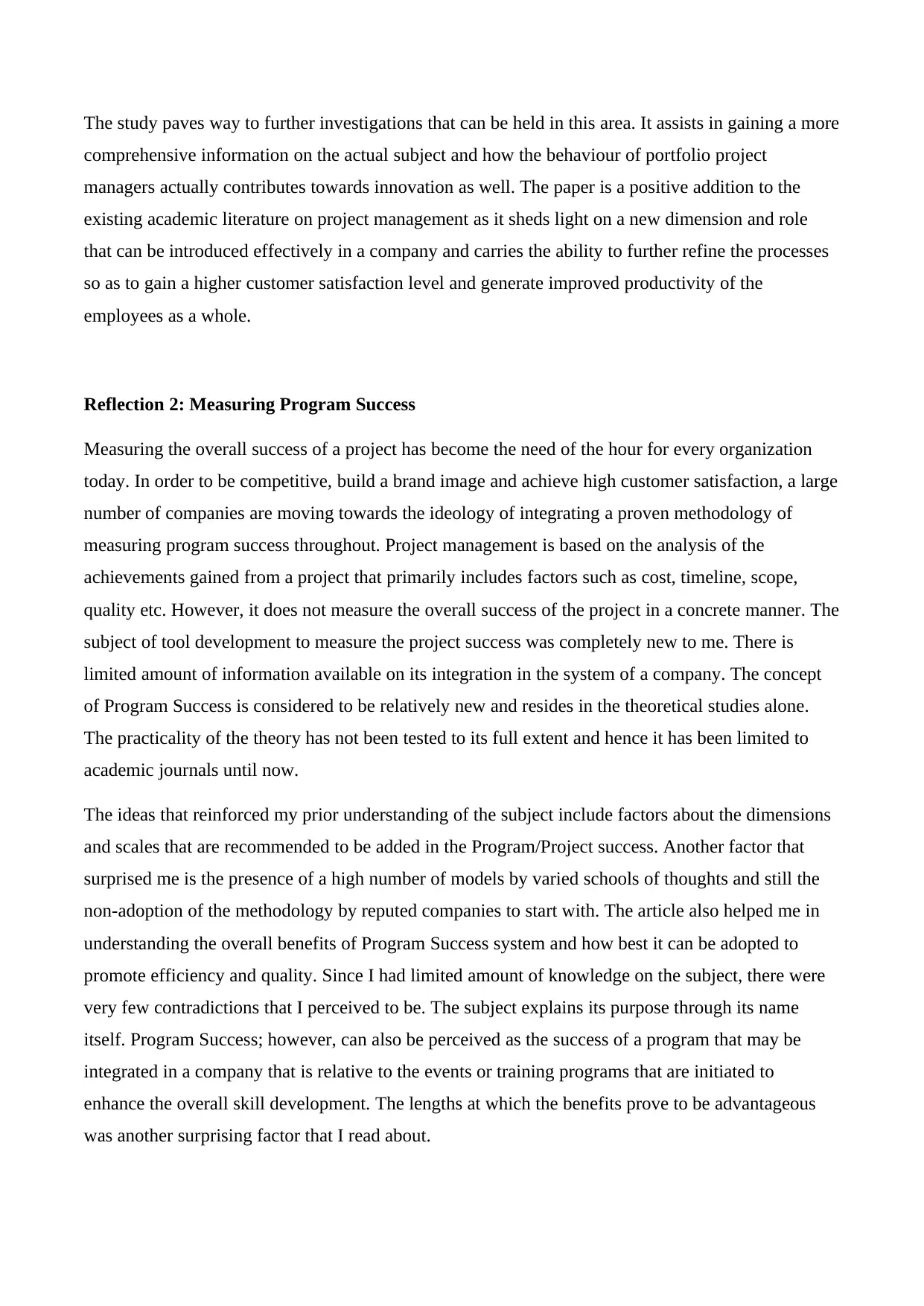
The study paves way to further investigations that can be held in this area. It assists in gaining a more
comprehensive information on the actual subject and how the behaviour of portfolio project
managers actually contributes towards innovation as well. The paper is a positive addition to the
existing academic literature on project management as it sheds light on a new dimension and role
that can be introduced effectively in a company and carries the ability to further refine the processes
so as to gain a higher customer satisfaction level and generate improved productivity of the
employees as a whole.
Reflection 2: Measuring Program Success
Measuring the overall success of a project has become the need of the hour for every organization
today. In order to be competitive, build a brand image and achieve high customer satisfaction, a large
number of companies are moving towards the ideology of integrating a proven methodology of
measuring program success throughout. Project management is based on the analysis of the
achievements gained from a project that primarily includes factors such as cost, timeline, scope,
quality etc. However, it does not measure the overall success of the project in a concrete manner. The
subject of tool development to measure the project success was completely new to me. There is
limited amount of information available on its integration in the system of a company. The concept
of Program Success is considered to be relatively new and resides in the theoretical studies alone.
The practicality of the theory has not been tested to its full extent and hence it has been limited to
academic journals until now.
The ideas that reinforced my prior understanding of the subject include factors about the dimensions
and scales that are recommended to be added in the Program/Project success. Another factor that
surprised me is the presence of a high number of models by varied schools of thoughts and still the
non-adoption of the methodology by reputed companies to start with. The article also helped me in
understanding the overall benefits of Program Success system and how best it can be adopted to
promote efficiency and quality. Since I had limited amount of knowledge on the subject, there were
very few contradictions that I perceived to be. The subject explains its purpose through its name
itself. Program Success; however, can also be perceived as the success of a program that may be
integrated in a company that is relative to the events or training programs that are initiated to
enhance the overall skill development. The lengths at which the benefits prove to be advantageous
was another surprising factor that I read about.
comprehensive information on the actual subject and how the behaviour of portfolio project
managers actually contributes towards innovation as well. The paper is a positive addition to the
existing academic literature on project management as it sheds light on a new dimension and role
that can be introduced effectively in a company and carries the ability to further refine the processes
so as to gain a higher customer satisfaction level and generate improved productivity of the
employees as a whole.
Reflection 2: Measuring Program Success
Measuring the overall success of a project has become the need of the hour for every organization
today. In order to be competitive, build a brand image and achieve high customer satisfaction, a large
number of companies are moving towards the ideology of integrating a proven methodology of
measuring program success throughout. Project management is based on the analysis of the
achievements gained from a project that primarily includes factors such as cost, timeline, scope,
quality etc. However, it does not measure the overall success of the project in a concrete manner. The
subject of tool development to measure the project success was completely new to me. There is
limited amount of information available on its integration in the system of a company. The concept
of Program Success is considered to be relatively new and resides in the theoretical studies alone.
The practicality of the theory has not been tested to its full extent and hence it has been limited to
academic journals until now.
The ideas that reinforced my prior understanding of the subject include factors about the dimensions
and scales that are recommended to be added in the Program/Project success. Another factor that
surprised me is the presence of a high number of models by varied schools of thoughts and still the
non-adoption of the methodology by reputed companies to start with. The article also helped me in
understanding the overall benefits of Program Success system and how best it can be adopted to
promote efficiency and quality. Since I had limited amount of knowledge on the subject, there were
very few contradictions that I perceived to be. The subject explains its purpose through its name
itself. Program Success; however, can also be perceived as the success of a program that may be
integrated in a company that is relative to the events or training programs that are initiated to
enhance the overall skill development. The lengths at which the benefits prove to be advantageous
was another surprising factor that I read about.
⊘ This is a preview!⊘
Do you want full access?
Subscribe today to unlock all pages.

Trusted by 1+ million students worldwide
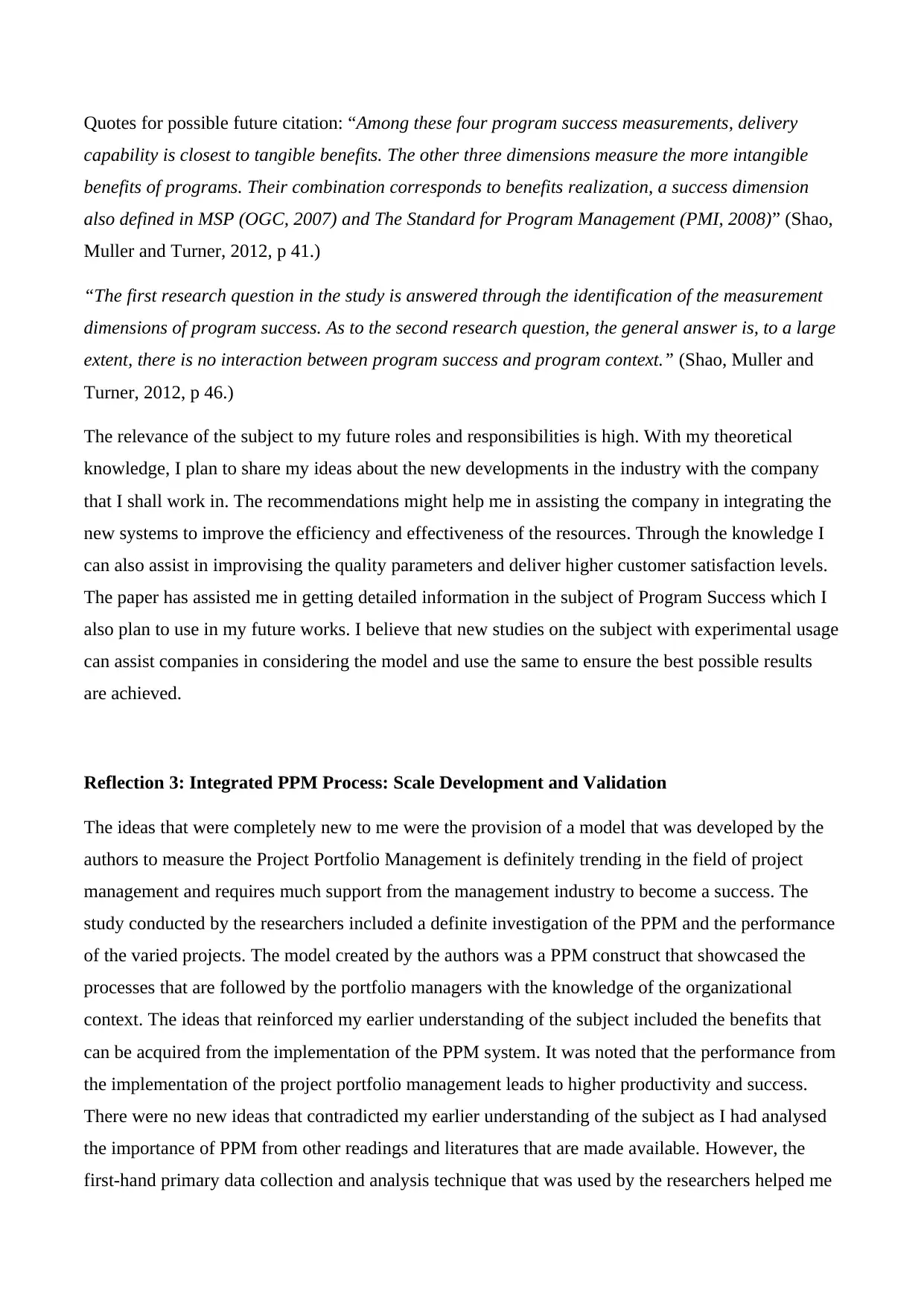
Quotes for possible future citation: “Among these four program success measurements, delivery
capability is closest to tangible benefits. The other three dimensions measure the more intangible
benefits of programs. Their combination corresponds to benefits realization, a success dimension
also defined in MSP (OGC, 2007) and The Standard for Program Management (PMI, 2008)” (Shao,
Muller and Turner, 2012, p 41.)
“The first research question in the study is answered through the identification of the measurement
dimensions of program success. As to the second research question, the general answer is, to a large
extent, there is no interaction between program success and program context.” (Shao, Muller and
Turner, 2012, p 46.)
The relevance of the subject to my future roles and responsibilities is high. With my theoretical
knowledge, I plan to share my ideas about the new developments in the industry with the company
that I shall work in. The recommendations might help me in assisting the company in integrating the
new systems to improve the efficiency and effectiveness of the resources. Through the knowledge I
can also assist in improvising the quality parameters and deliver higher customer satisfaction levels.
The paper has assisted me in getting detailed information in the subject of Program Success which I
also plan to use in my future works. I believe that new studies on the subject with experimental usage
can assist companies in considering the model and use the same to ensure the best possible results
are achieved.
Reflection 3: Integrated PPM Process: Scale Development and Validation
The ideas that were completely new to me were the provision of a model that was developed by the
authors to measure the Project Portfolio Management is definitely trending in the field of project
management and requires much support from the management industry to become a success. The
study conducted by the researchers included a definite investigation of the PPM and the performance
of the varied projects. The model created by the authors was a PPM construct that showcased the
processes that are followed by the portfolio managers with the knowledge of the organizational
context. The ideas that reinforced my earlier understanding of the subject included the benefits that
can be acquired from the implementation of the PPM system. It was noted that the performance from
the implementation of the project portfolio management leads to higher productivity and success.
There were no new ideas that contradicted my earlier understanding of the subject as I had analysed
the importance of PPM from other readings and literatures that are made available. However, the
first-hand primary data collection and analysis technique that was used by the researchers helped me
capability is closest to tangible benefits. The other three dimensions measure the more intangible
benefits of programs. Their combination corresponds to benefits realization, a success dimension
also defined in MSP (OGC, 2007) and The Standard for Program Management (PMI, 2008)” (Shao,
Muller and Turner, 2012, p 41.)
“The first research question in the study is answered through the identification of the measurement
dimensions of program success. As to the second research question, the general answer is, to a large
extent, there is no interaction between program success and program context.” (Shao, Muller and
Turner, 2012, p 46.)
The relevance of the subject to my future roles and responsibilities is high. With my theoretical
knowledge, I plan to share my ideas about the new developments in the industry with the company
that I shall work in. The recommendations might help me in assisting the company in integrating the
new systems to improve the efficiency and effectiveness of the resources. Through the knowledge I
can also assist in improvising the quality parameters and deliver higher customer satisfaction levels.
The paper has assisted me in getting detailed information in the subject of Program Success which I
also plan to use in my future works. I believe that new studies on the subject with experimental usage
can assist companies in considering the model and use the same to ensure the best possible results
are achieved.
Reflection 3: Integrated PPM Process: Scale Development and Validation
The ideas that were completely new to me were the provision of a model that was developed by the
authors to measure the Project Portfolio Management is definitely trending in the field of project
management and requires much support from the management industry to become a success. The
study conducted by the researchers included a definite investigation of the PPM and the performance
of the varied projects. The model created by the authors was a PPM construct that showcased the
processes that are followed by the portfolio managers with the knowledge of the organizational
context. The ideas that reinforced my earlier understanding of the subject included the benefits that
can be acquired from the implementation of the PPM system. It was noted that the performance from
the implementation of the project portfolio management leads to higher productivity and success.
There were no new ideas that contradicted my earlier understanding of the subject as I had analysed
the importance of PPM from other readings and literatures that are made available. However, the
first-hand primary data collection and analysis technique that was used by the researchers helped me
Paraphrase This Document
Need a fresh take? Get an instant paraphrase of this document with our AI Paraphraser
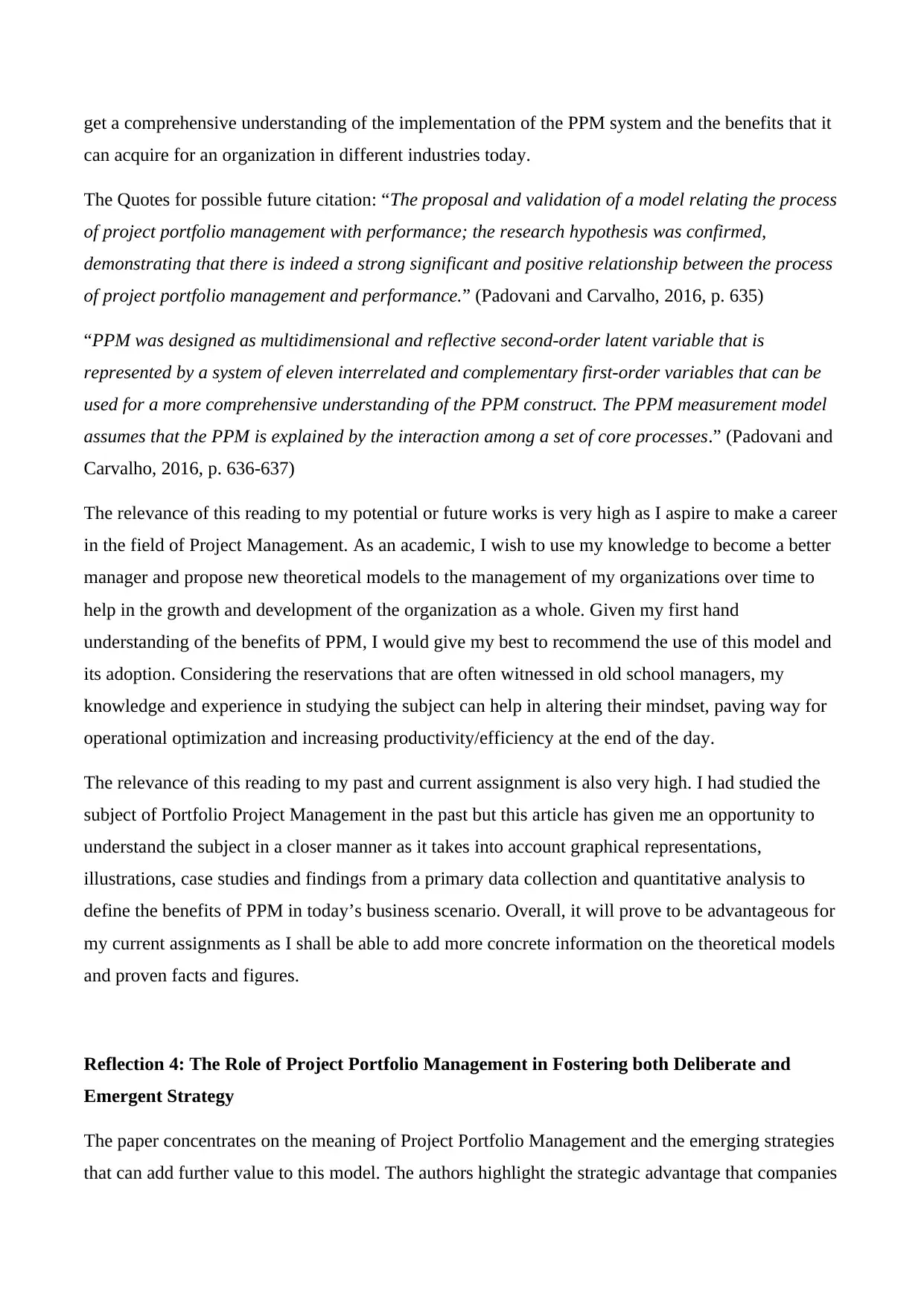
get a comprehensive understanding of the implementation of the PPM system and the benefits that it
can acquire for an organization in different industries today.
The Quotes for possible future citation: “The proposal and validation of a model relating the process
of project portfolio management with performance; the research hypothesis was confirmed,
demonstrating that there is indeed a strong significant and positive relationship between the process
of project portfolio management and performance.” (Padovani and Carvalho, 2016, p. 635)
“PPM was designed as multidimensional and reflective second-order latent variable that is
represented by a system of eleven interrelated and complementary first-order variables that can be
used for a more comprehensive understanding of the PPM construct. The PPM measurement model
assumes that the PPM is explained by the interaction among a set of core processes.” (Padovani and
Carvalho, 2016, p. 636-637)
The relevance of this reading to my potential or future works is very high as I aspire to make a career
in the field of Project Management. As an academic, I wish to use my knowledge to become a better
manager and propose new theoretical models to the management of my organizations over time to
help in the growth and development of the organization as a whole. Given my first hand
understanding of the benefits of PPM, I would give my best to recommend the use of this model and
its adoption. Considering the reservations that are often witnessed in old school managers, my
knowledge and experience in studying the subject can help in altering their mindset, paving way for
operational optimization and increasing productivity/efficiency at the end of the day.
The relevance of this reading to my past and current assignment is also very high. I had studied the
subject of Portfolio Project Management in the past but this article has given me an opportunity to
understand the subject in a closer manner as it takes into account graphical representations,
illustrations, case studies and findings from a primary data collection and quantitative analysis to
define the benefits of PPM in today’s business scenario. Overall, it will prove to be advantageous for
my current assignments as I shall be able to add more concrete information on the theoretical models
and proven facts and figures.
Reflection 4: The Role of Project Portfolio Management in Fostering both Deliberate and
Emergent Strategy
The paper concentrates on the meaning of Project Portfolio Management and the emerging strategies
that can add further value to this model. The authors highlight the strategic advantage that companies
can acquire for an organization in different industries today.
The Quotes for possible future citation: “The proposal and validation of a model relating the process
of project portfolio management with performance; the research hypothesis was confirmed,
demonstrating that there is indeed a strong significant and positive relationship between the process
of project portfolio management and performance.” (Padovani and Carvalho, 2016, p. 635)
“PPM was designed as multidimensional and reflective second-order latent variable that is
represented by a system of eleven interrelated and complementary first-order variables that can be
used for a more comprehensive understanding of the PPM construct. The PPM measurement model
assumes that the PPM is explained by the interaction among a set of core processes.” (Padovani and
Carvalho, 2016, p. 636-637)
The relevance of this reading to my potential or future works is very high as I aspire to make a career
in the field of Project Management. As an academic, I wish to use my knowledge to become a better
manager and propose new theoretical models to the management of my organizations over time to
help in the growth and development of the organization as a whole. Given my first hand
understanding of the benefits of PPM, I would give my best to recommend the use of this model and
its adoption. Considering the reservations that are often witnessed in old school managers, my
knowledge and experience in studying the subject can help in altering their mindset, paving way for
operational optimization and increasing productivity/efficiency at the end of the day.
The relevance of this reading to my past and current assignment is also very high. I had studied the
subject of Portfolio Project Management in the past but this article has given me an opportunity to
understand the subject in a closer manner as it takes into account graphical representations,
illustrations, case studies and findings from a primary data collection and quantitative analysis to
define the benefits of PPM in today’s business scenario. Overall, it will prove to be advantageous for
my current assignments as I shall be able to add more concrete information on the theoretical models
and proven facts and figures.
Reflection 4: The Role of Project Portfolio Management in Fostering both Deliberate and
Emergent Strategy
The paper concentrates on the meaning of Project Portfolio Management and the emerging strategies
that can add further value to this model. The authors highlight the strategic advantage that companies
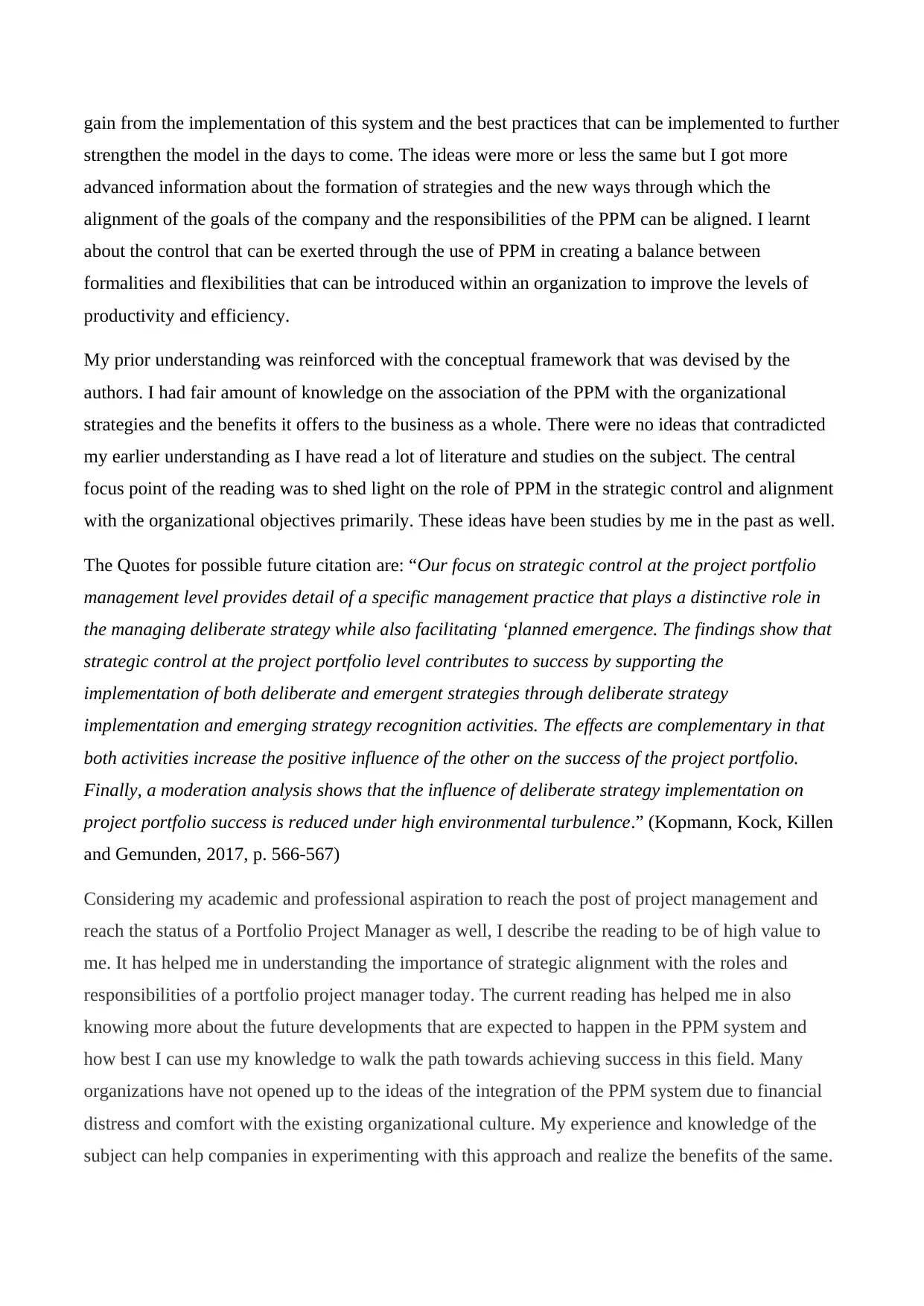
gain from the implementation of this system and the best practices that can be implemented to further
strengthen the model in the days to come. The ideas were more or less the same but I got more
advanced information about the formation of strategies and the new ways through which the
alignment of the goals of the company and the responsibilities of the PPM can be aligned. I learnt
about the control that can be exerted through the use of PPM in creating a balance between
formalities and flexibilities that can be introduced within an organization to improve the levels of
productivity and efficiency.
My prior understanding was reinforced with the conceptual framework that was devised by the
authors. I had fair amount of knowledge on the association of the PPM with the organizational
strategies and the benefits it offers to the business as a whole. There were no ideas that contradicted
my earlier understanding as I have read a lot of literature and studies on the subject. The central
focus point of the reading was to shed light on the role of PPM in the strategic control and alignment
with the organizational objectives primarily. These ideas have been studies by me in the past as well.
The Quotes for possible future citation are: “Our focus on strategic control at the project portfolio
management level provides detail of a specific management practice that plays a distinctive role in
the managing deliberate strategy while also facilitating ‘planned emergence. The findings show that
strategic control at the project portfolio level contributes to success by supporting the
implementation of both deliberate and emergent strategies through deliberate strategy
implementation and emerging strategy recognition activities. The effects are complementary in that
both activities increase the positive influence of the other on the success of the project portfolio.
Finally, a moderation analysis shows that the influence of deliberate strategy implementation on
project portfolio success is reduced under high environmental turbulence.” (Kopmann, Kock, Killen
and Gemunden, 2017, p. 566-567)
Considering my academic and professional aspiration to reach the post of project management and
reach the status of a Portfolio Project Manager as well, I describe the reading to be of high value to
me. It has helped me in understanding the importance of strategic alignment with the roles and
responsibilities of a portfolio project manager today. The current reading has helped me in also
knowing more about the future developments that are expected to happen in the PPM system and
how best I can use my knowledge to walk the path towards achieving success in this field. Many
organizations have not opened up to the ideas of the integration of the PPM system due to financial
distress and comfort with the existing organizational culture. My experience and knowledge of the
subject can help companies in experimenting with this approach and realize the benefits of the same.
strengthen the model in the days to come. The ideas were more or less the same but I got more
advanced information about the formation of strategies and the new ways through which the
alignment of the goals of the company and the responsibilities of the PPM can be aligned. I learnt
about the control that can be exerted through the use of PPM in creating a balance between
formalities and flexibilities that can be introduced within an organization to improve the levels of
productivity and efficiency.
My prior understanding was reinforced with the conceptual framework that was devised by the
authors. I had fair amount of knowledge on the association of the PPM with the organizational
strategies and the benefits it offers to the business as a whole. There were no ideas that contradicted
my earlier understanding as I have read a lot of literature and studies on the subject. The central
focus point of the reading was to shed light on the role of PPM in the strategic control and alignment
with the organizational objectives primarily. These ideas have been studies by me in the past as well.
The Quotes for possible future citation are: “Our focus on strategic control at the project portfolio
management level provides detail of a specific management practice that plays a distinctive role in
the managing deliberate strategy while also facilitating ‘planned emergence. The findings show that
strategic control at the project portfolio level contributes to success by supporting the
implementation of both deliberate and emergent strategies through deliberate strategy
implementation and emerging strategy recognition activities. The effects are complementary in that
both activities increase the positive influence of the other on the success of the project portfolio.
Finally, a moderation analysis shows that the influence of deliberate strategy implementation on
project portfolio success is reduced under high environmental turbulence.” (Kopmann, Kock, Killen
and Gemunden, 2017, p. 566-567)
Considering my academic and professional aspiration to reach the post of project management and
reach the status of a Portfolio Project Manager as well, I describe the reading to be of high value to
me. It has helped me in understanding the importance of strategic alignment with the roles and
responsibilities of a portfolio project manager today. The current reading has helped me in also
knowing more about the future developments that are expected to happen in the PPM system and
how best I can use my knowledge to walk the path towards achieving success in this field. Many
organizations have not opened up to the ideas of the integration of the PPM system due to financial
distress and comfort with the existing organizational culture. My experience and knowledge of the
subject can help companies in experimenting with this approach and realize the benefits of the same.
⊘ This is a preview!⊘
Do you want full access?
Subscribe today to unlock all pages.

Trusted by 1+ million students worldwide

Lastly, I would like to highlight that the paper has been a major eye opener and contributor to my
current academic assignments as I have used the information provided to further research the subject
of PPM and realize its growing importance. Although there are very few case studies available;
however, the reading supplemented a high amount of information that was used to clear doubts and
add formulate better assignments from the futuristic perspective.
current academic assignments as I have used the information provided to further research the subject
of PPM and realize its growing importance. Although there are very few case studies available;
however, the reading supplemented a high amount of information that was used to clear doubts and
add formulate better assignments from the futuristic perspective.
Paraphrase This Document
Need a fresh take? Get an instant paraphrase of this document with our AI Paraphraser
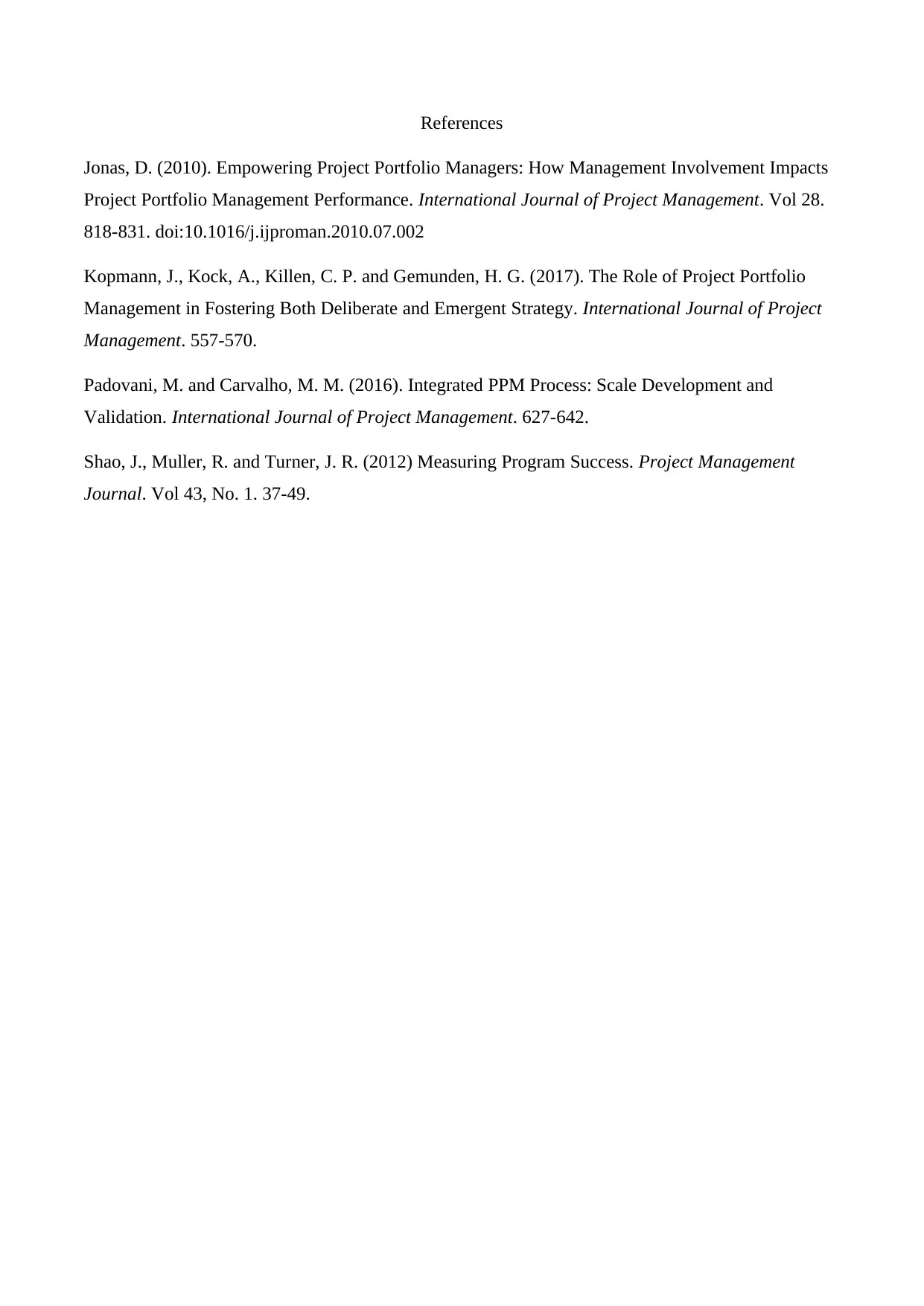
References
Jonas, D. (2010). Empowering Project Portfolio Managers: How Management Involvement Impacts
Project Portfolio Management Performance. International Journal of Project Management. Vol 28.
818-831. doi:10.1016/j.ijproman.2010.07.002
Kopmann, J., Kock, A., Killen, C. P. and Gemunden, H. G. (2017). The Role of Project Portfolio
Management in Fostering Both Deliberate and Emergent Strategy. International Journal of Project
Management. 557-570.
Padovani, M. and Carvalho, M. M. (2016). Integrated PPM Process: Scale Development and
Validation. International Journal of Project Management. 627-642.
Shao, J., Muller, R. and Turner, J. R. (2012) Measuring Program Success. Project Management
Journal. Vol 43, No. 1. 37-49.
Jonas, D. (2010). Empowering Project Portfolio Managers: How Management Involvement Impacts
Project Portfolio Management Performance. International Journal of Project Management. Vol 28.
818-831. doi:10.1016/j.ijproman.2010.07.002
Kopmann, J., Kock, A., Killen, C. P. and Gemunden, H. G. (2017). The Role of Project Portfolio
Management in Fostering Both Deliberate and Emergent Strategy. International Journal of Project
Management. 557-570.
Padovani, M. and Carvalho, M. M. (2016). Integrated PPM Process: Scale Development and
Validation. International Journal of Project Management. 627-642.
Shao, J., Muller, R. and Turner, J. R. (2012) Measuring Program Success. Project Management
Journal. Vol 43, No. 1. 37-49.
1 out of 8
Related Documents
Your All-in-One AI-Powered Toolkit for Academic Success.
+13062052269
info@desklib.com
Available 24*7 on WhatsApp / Email
![[object Object]](/_next/static/media/star-bottom.7253800d.svg)
Unlock your academic potential
Copyright © 2020–2026 A2Z Services. All Rights Reserved. Developed and managed by ZUCOL.


![Project & Program Management Analysis Report - [University Name]](/_next/image/?url=https%3A%2F%2Fdesklib.com%2Fmedia%2Fimages%2Fdq%2Fd3178dd01478444e99d8c97f48d049cf.jpg&w=256&q=75)

